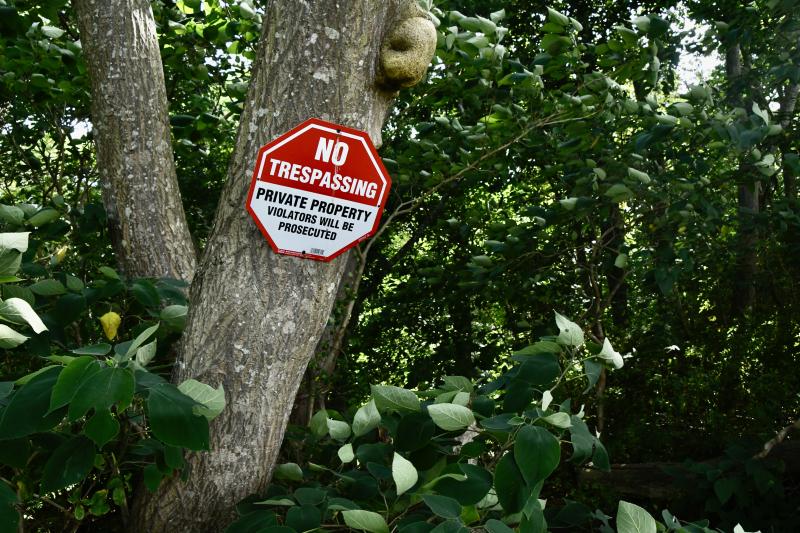Homeless camp near Route 1 church is vacated
The odds are stacked against the homeless, and those odds are even greater in the Cape Region with no year-round shelters available.
When people pitch tents in the woods, camps become a nuisance to neighboring communities and businesses.
So it was inevitable that a camp off Route 1 near Rehoboth Beach would not last. For the second time in 10 years, the encampment in the woods behind Rehoboth Presbyterian Church of Midway has been dismantled.
On June 18, led by Delaware State Police, a crew from the Department of Corrections, Sussex County code enforcement staff and the Delaware Department of Transportation gathered at the site to clean up the homeless camp. People at the camp had been given a deadline to vacate the property.
Issues with camp
Delaware State Police Cpl. Lewis Briggs said the church, one of four property owners in the vicinity, had been having issues with homeless people even with no trespassing signs placed in the area. The signs had been torn down, and despite repeated warnings to the homeless camp they had to vacate the property, the homeless encampment remained.
There had also been reports filed with state police regarding stolen items in the area.
“Considering all these factors, we began working on a plan to assist the church in mitigating the trespassing and cleaning up the area,” Briggs said.
Briggs said staff with the Police Diversion Program at Troop 7 and an encampment team started meeting with the homeless to offer them resources and support.
Six to eight people had been staying at the camp. Briggs said some left before the eviction day, while three remained and were moving their personal belongings. “They left the area peacefully,” he said.
Briggs said the camp comprised mostly men 30-59 years old, but a few women had also been seen in the area.
Police staff and encampment team members once again offered services that were declined by the homeless residents.
According to Briggs, only a small section of the property was cleaned, and two 30-yard dumpsters were filled.
“We recognize the challenges faced by those experiencing homelessness, and made every effort to provide support and resources. Our goal is to address the concerns of the property owners while showing compassion and respect for the individuals involved,” Briggs said.
Camp has history
The encampment goes back more than a decade to when a soup kitchen operated next to the church. At that time, the out-of-town property owner allowed some people to stay in the woods out of compassion, Briggs said.
By the end of 2013, county officials informed the property owner that the homeless encampment was in violation of county code and must be removed.
The next year, in April, members of the state police cleared out the woods and, for the most part, it’s remained that way until recently.
That same year, a homeless encampment along Hebron Road near Rehoboth Beach was also dismantled.
No place for homeless
There are no shelters in the Lewes-Rehoboth Beach area. Mike Agnew, director of Cape Code Purple, said he and his volunteers continue to provide assistance to their guests during the summer and fall until the Code Purple shelter opens.
From Dec. 1 to March 15, St. Jude the Apostle Church in Lewes provides a men’s shelter, and Lutheran Church of Our Savior in Rehoboth Beach opens a women’s shelter.
But for eight months of the year, there is no place to find shelter in the Cape Region.
He said there is a group of 25 homeless people living in tents in the area. “They have no other place to go other than the woods because there is no shelter in the Lewes-Rehoboth area,” he added.
Agnew said all but two of the group have jobs but can’t afford the high rents in the Cape Region.
“They have to get on one of the many lists for low-income housing, but the waiting time is a year to 18 months. There is no central list, so they have to contact every low-income project separately,” he said.
He said the Community Resource Center in Rehoboth Beach is open weekends, and Epworth United Methodist Church near Rehoboth Beach operates a soup kitchen three days a week. “But they have no roof, no place to stay,” he said. “And it’s more than just housing people; wrap-around services are critical.”
A way out
Homeless advocate Jim Martin, director of Shepherd’s Office in Georgetown, said if a homeless person is committed to bettering themselves and finding housing, there is a good chance some type of emergency housing can be found. He coaches people to get a job, set goals, get involved with a church, seek an advocate like Martin, go the CRC and make themselves known, and call the 211 helpline every day to get on the state homeless register for that day.
“They have to learn to be the squeaky wheel in a polite way,” Martin said. “It will be the fight of their lives.”
Martin said many homeless have no way to communicate, with no phone or email. “Many have no money or very limited resources. We try to get them connected again,” he said.






















































